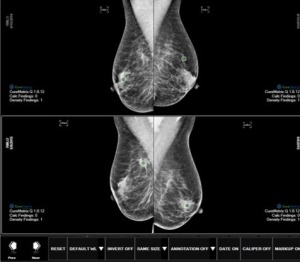por
John R. Fischer, Senior Reporter | September 27, 2021

Less than half of 342 Italian radiologists were able to complete an online mammogram self-assessment successfully
The more experience a radiologist has does not necessarily equate to accurate diagnostic interpretations when reading images. That’s what researchers at the Italian Society of Medical Radiology are concluding after finding that less than half of experienced radiologists were able to successfully complete an online self-assessment of mammograms.
Out of 342 who completed the test, only 28.7% passed on their first attempt. Of the remaining, 138 tried again, with only 35.5% passing. Participants had a median of eight years of breast imaging experience, with 38.3% saying they had more than 10 years, according to the authors.
“This national self-evaluation test effectively differentiated multiple aspects of mammographic reading experience, but specific breast imaging experience was shown not to strictly guarantee good diagnostic accuracy,” they wrote in their study.




Ad Statistics
Times Displayed: 36769
Times Visited: 1000 Stay up to date with the latest training to fix, troubleshoot, and maintain your critical care devices. GE HealthCare offers multiple training formats to empower teams and expand knowledge, saving you time and money
Radiologists were tasked with assessing 24 pathology-confirmed cancers and 108 that were reported as negative in double readings. All were acquired with full-field digital mammography from women between 50 and 69, the age group that is at average risk for breast cancer. The pass threshold for sensitivity was 62% and 86% for specificity. Together, participants had a median number of 1,501 mammographic interpretations, and the majority worked in the public sector (68.7%).
When combining first and second attempts, only 44.2% (151 out of 342) in total completed the online self-assessment successfully. All individual variables had significantly correlated to pass rates and diagnostic sensitivity, aside from gender. Only involvement in organized screening programs and the number of mammograms read per year were positively associated with specificity.
The researchers also applied regression analysis, which showed a significant association with diagnostic accuracy for those who reported assessing more than 3,000 mammograms per year versus radiologists who read less than 1000 (Odds ratio, OR = 3.88, 95% CI 1.07 – 14.14, p = 0.04). In addition, those who worked in the private sector were more successful at diagnosing mammograms accurately than those in the public sector (OR = 1.65). For this portion of the study, variables such as age, self-judged interpretive skills and years of breast imaging experience had no significant effect.
The researchers say the online assessment is less biased than audits on performance and offers more insight on the diagnostic skills of individual radiologists. “Due to its easy use and the validity of obtained results, this test could be extended to all Italian breast radiologists, regardless of their experience, also as a Breast Unit accreditation criterion.”
The findings were published in
European Radiology.

